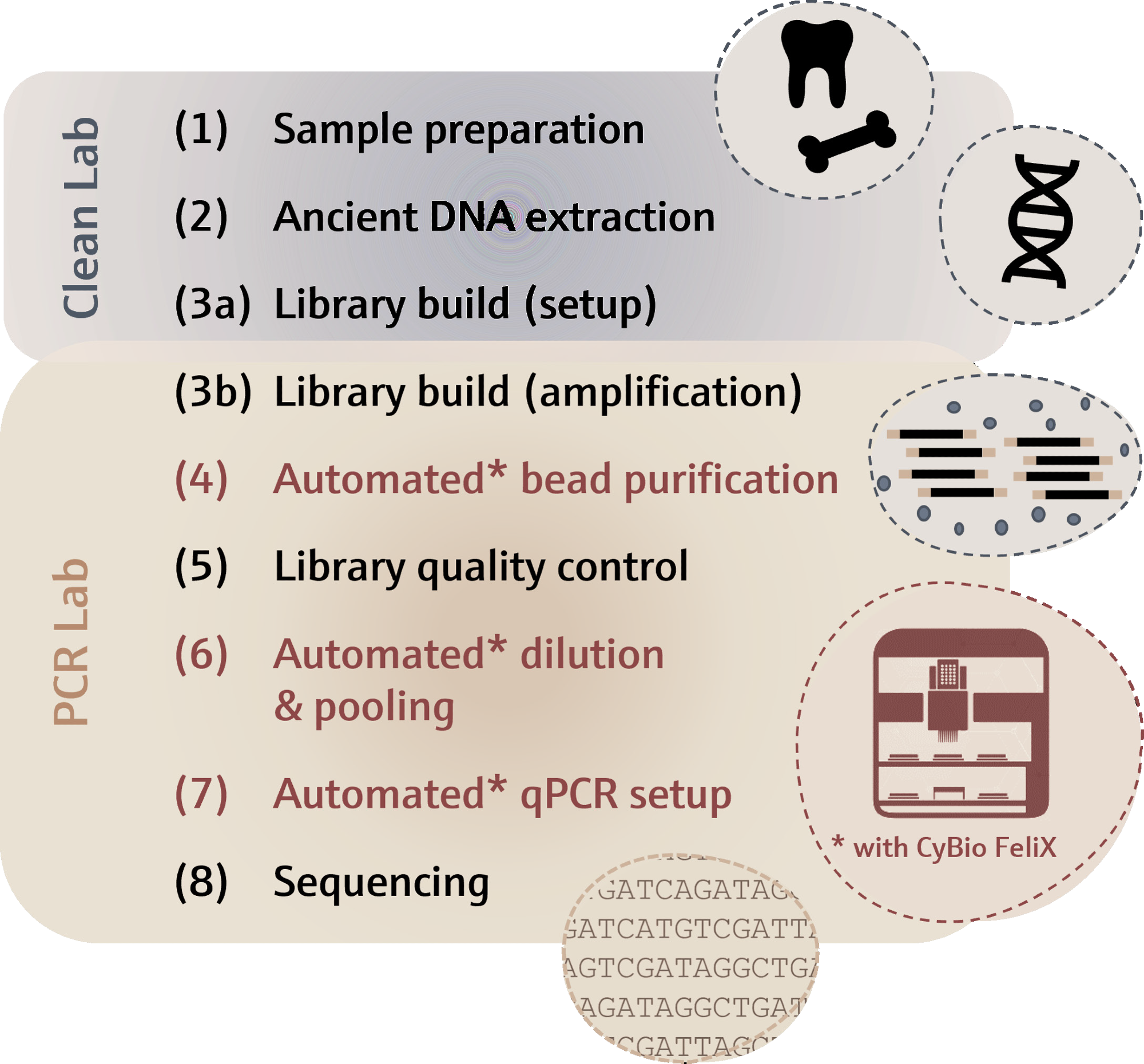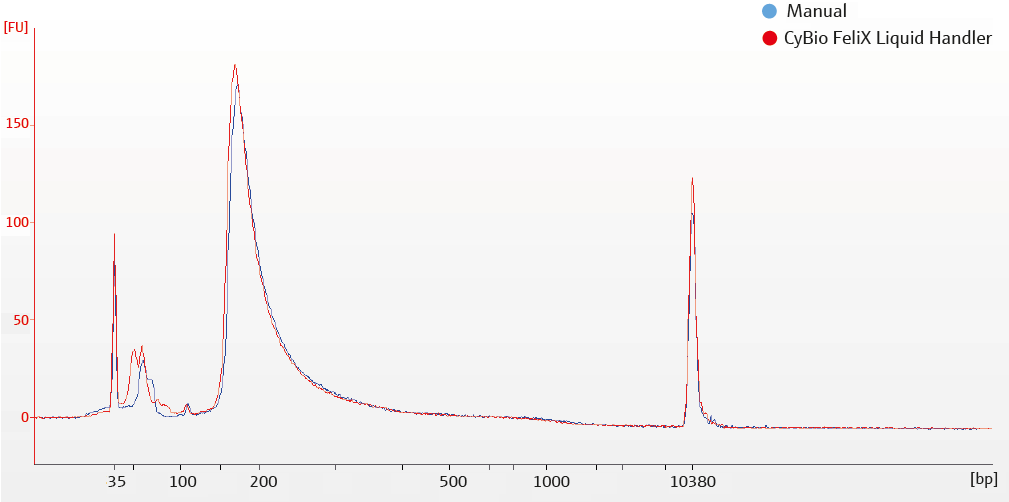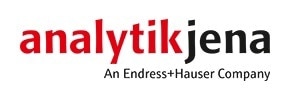This article is based on a poster originally authored by Ariane Jonetz-Mentzel et al.
The GeoGenetics Center of the Lundbeck Foundation has developed a cutting-edge Next Generation Sequencing (NGS) pipeline, enabling the analysis of 5,000 ancient genomes. This significant advancement facilitates a comprehensive study into the evolutionary trajectory of neurological and mental disorders spanning the last 10,000 years.
To boost the efficiency, reproducibility, and throughput of the pipeline, certain processes have been automated using Analytik Jena‘s CyBio FeliX liquid handling platform. These processes include bead-based purification, sequencing library pooling, and real-time PCR setup.
The platform’s adaptability effectively tackled the challenges posed by the quantity and quality of ancient DNA. The outcomes reveal similar quality levels achieved through both automated and manual procedures, underscoring the dependability and advantages of automation in extensive genome projects.
This automated workflow not only enhances efficiency in laboratory operations but also fosters the long-term welfare of personnel by reducing repetitive tasks, thus underscoring the advantageous role of automation in genomics research.
Download the Poster
Introduction

Figure 1. Schematic overview of the library construction workflow for NGS. Image Credit: Analytik Jena US
In order to examine the evolution of neurological and mental diseases spanning the last 10,000 years, the Lundbeck Foundation GeoGenetics Centre established a semi-automated pipeline for the preparation of libraries intended for Next Generation Sequencing (NGS).
Ancient DNA (aDNA) extracted from old material (bones and teeth) was used as the starting material for the preparation of the libraries. The CyBio FeliX liquid handler from
Analytik Jena was used to automate bead-based purification steps (4), dilute and pool the libraries (6), and prepare the quantification by quantitative (q)PCR (Figure 1).
The flexibility of the CyBio FeliX liquid handler allowed for customization of the configurations required for each step, ensuring reproducibility and enhancing the user’s experience by reducing the laborious nature of the workload.
Methods
Bead Purification of NGS libraries
Step 1: Configure the robot with all necessary materials (Figure 2)
Step 2: DNA fragments and beads are mixed together
Step 3: The beads are washed
Step 4: Drying of the beads
Step 5: DNA fragments eluted
Step 6: The eluted DNA fragments undergo the final transfer
Pooling of NGS libraries
Step 1: Import csv file
Step 2: The dilutions are prepared
Step 3: Samples pooled together
Setup of Real-time qPCR
Step 1: Pre-pipetting of the dilution buffer
Step 2: Initial sample dilution carried out
Step 3: The qPCR master mix is transferred
Step 4: Samples undergo a second dilution stage and are added to the prepared master mix
Step 5: Transfer of qPCR standards

Figure 2. Deck layout for automated bead purification. Image Credit: Analytik Jena US
Results and discussion
The CyBio FeliX’s automated workflow made up almost two-thirds of the 22,000 libraries generated, which improved efficiency considerably. Typically, it would take ten people around three weeks to create about 24-48 libraries manually. However, using the automated workflow, one person would be able to create 400 libraries across the same 3-week period.

Figure 3. Library quality control. Image Credit: Analytik Jena US
Bead purification
The quality and preparation time of the DNA libraries is relatively proportional for both automated and manual bead purification (Figure 3).
The advantage of automating this step is the reliable reproducibility that can be achieved in terms of the quality of the results. Compared to using the CyBio FeliX CHOICE head, the multi-channel CyBio FeliX Head R 96/1000 µL can help shorten the processing time by 50% and is, therefore, ideal when it comes to a higher throughput.
Pooling
Manual methods typically involve individual dilution and transfer steps, which makes them particularly prone to errors.
The CyBio FeliX software automates this process by importing a .csv file containing DNA library quantification data and producing error-free pooled DNA libraries according to specified parameters. Up to 192 individual DNA libraries were pooled for sequencing.
When evaluating the sequence data, equimolarity was found to be consistently better with the automated setup than with the manual setup (data not shown).
qPCR setup
When using CyBio FeliX, the crossing point (Cp) deviations between different library preparations are lower compared to a manual setup. This suggests that an automated workflow produces higher reproducibility (Table 1).
Table 1. Comparison of the reproducibility of the qPCR setups. Analytik Jena US
| Sample |
A |
B |
C |
D |
E |
F |
G |
| Manual |
Cp |
13.67 |
12.97 |
14.49 |
13.87 |
13.92 |
13.76 |
13.18 |
12.56 |
11.87 |
11.55 |
11.80 |
11.62 |
13.87 |
13.40 |
| 13.70 |
12.93 |
14.50 |
13.89 |
14.04 |
13.76 |
13.01 |
12.54 |
11.86 |
11.57 |
11.89 |
11.59 |
13.88 |
13.42 |
| X |
49.9% |
49.9% |
50.0% |
50.0% |
49.8% |
50.0% |
50.3% |
50.0% |
50.0% |
50.0% |
49.8% |
50.1% |
50.0% |
50.0% |
| Y |
105.7% |
104.4% |
101.6% |
104.3% |
102.6% |
102.1% |
103.5% |
| CyBio FeliX |
Cp |
14.00 |
13.94 |
14.67 |
14.67 |
14.23 |
14.09 |
13.47 |
13.42 |
12.54 |
12.50 |
12.55 |
12.52 |
14.45 |
14.51 |
| 14.01 |
13.95 |
14.65 |
14.64 |
14.19 |
14.06 |
13.43 |
13.33 |
12.46 |
12.51 |
12.53 |
12.44 |
14.44 |
14.58 |
| X |
50.0% |
50.0% |
50.0% |
50.1% |
50.1% |
50.1% |
50.1% |
50.2% |
50.2% |
50.0% |
50.0% |
50.2% |
50.0% |
49.9% |
| Y |
100.4% |
100.0% |
101.0% |
100.6% |
100.0% |
100.5% |
99.3% |
Conclusion
By utilizing the CyBio FeliX benchtop liquid handling system to help automate NGS library preparation, which encompasses bead-based library purification, qPCR setup, and pooling, a sole operator can generate twice the number of sequencing libraries compared to a manual workflow involving ten users.
This automation enhances data quality through increased reproducibility and promotes the well-being of laboratory staff by improving ergonomics. Furthermore, the cost-saving benefits of automation are particularly notable in the improved reproducibility of the qPCR setup within this project.
Download the Poster
About Analytik Jena US
Analytik Jena is a provider of instruments and products in the areas of analytical measuring technology and life science. Its portfolio includes the most modern analytical technology and complete systems for bioanalytical applications in the life science area.
Comprehensive laboratory software management and information systems (LIMS), service offerings, as well as device-specific consumables and disposables, such as reagents or plastic articles, complete the Group’s extensive range of products.
About life science
The Life Science product area demonstrates the biotechnological competence of Analytik Jena AG. We provide a wide product spectrum for automated total, as well as individual solutions for molecular diagnostics. Our products are focused to offer you a quality and the reproducibility of your laboratory results.
This will surely ease your daily work and speed up your work processes in a certain way. All together we support you through the complete process of the lab work. Besides we offer customized solutions and are able to adapt our products to your needs. Automated high-throughput screening systems for the pharmaceutical sector are also part of this segment’s extensive portfolio.
About analytical instrumentation
Analytik Jena has a long tradition in developing high-performance precision analytical systems which dates back to the inventions made by Ernst Abbe and Carl Zeiss. We have grown to become one of the most innovative manufacturers of analytical measuring technology worldwide.
Our business unit Analytical Instrumentation offers excellent competencies in the fields of optical spectroscopy, sum parameters and elemental analysis. Being proud of our core competency we grant all our customers a long-term warranty of 10 years for our high-performance optics.
About lab automation
With more than 25 years of market experience, Analytik Jena with its CyBio® Product Line is a leading provider for high quality liquid handling and automation technologies. In the pharmaceutical and life science industries, our products enjoy the highest reputation for precision, reliability, robustness and simplicity.
Moreover, the Automation Team designs, produces and installs fully automated systems tailored to our clients' application, throughput and capacity requirements. From stand-alone CyBio® Well up to fully customized robotic systems we handle your compounds, biomolecules and cells with great care.
Sponsored Content Policy: News-Medical.net publishes articles and related content that may be derived from sources where we have existing commercial relationships, provided such content adds value to the core editorial ethos of News-Medical.Net which is to educate and inform site visitors interested in medical research, science, medical devices and treatments.
Last Updated: May 3, 2024